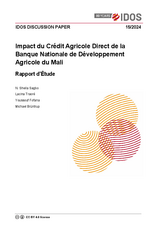Discussion Paper
Impact du crédit agricole direct de la Banque Nationale de Développement Agricole du Mali: rapport d’étude
Sagbo, N. Sheila / Lacina Traoré / Youssouf Fofana / Michael BrüntrupDiscussion Paper (15/2024)
Bonn: German Institute of Development and Sustainability (IDOS)
ISBN: 978-3-96021-240-9
DOI: https://doi.org/10.23661/idp15.2024
Preis: 6 €
(Résumé exécutif - page 1)
Limited access to financing is a major barrier to the development of the agricultural and food sectors in Sub-Saharan Africa. This study, commissioned by the German Financial Cooperation (KfW Development Bank) in partnership with the German Institute of Development and Sustainability (IDOS) assesses the impact of agricultural loans provided by the National Bank for Agricultural Development (BNDA) in Mali between 2012 and 2022. BNDA is the main provider of agricultural loans in Mali.
Methodology
The study employs an adapted version of the quasi-experimental "pipeline" approach. It compares «experienced» (old) clients to «inexperienced» (new) BNDA clients, where experience is measured through a composed indicator of seniority, regularity, and intensity of credit use. A random sample of 1,000 BNDA clients was selected from the regions of Koulikoro, Sikasso, and the district of Bamako, representing about 63% of BNDA's agricultural loans during the studied period. Propensity score matching techniques were used to compare various dimensions of wellbeing of experienced and inexperienced borrowers, alongside self-assessments of the loans' impact.
Key findings
Recipients generally reported positive impacts from the loans, with 75% describing the credit’s effect on their living conditions as positive and 6% as very positive. Key results of the analysis include:
- Agricultural intensification and land use: The credit facilitated increased agricultural activity, particularly in high-potential areas such as Sikasso. In Koulikoro, loans led to expanded cultivated areas, whereas in Sikasso, they enabled intensification with a reduction in cultivated land area. Additionally, credit supported the development of diversified activities, particularly among women and in areas where agriculture is less profitable.
- Income generation: On average, experienced borrowers generated an additional 17 FCFA of total income (agricultural and non-agricultural) for each FCFA borrowed, compared to new borrowers. Male clients exhibited more significant positive marginal effects than females.
- Asset accumulation: While new clients tended to accumulate productive assets, experienced clients, especially those in village associations, were more likely to accumulate domestic goods.
- Food security and nutrition: Credit moderately improved food security, particularly for village association members. It also enhanced dietary diversity, especially for women, with a roughly 8-point improvement in their dietary diversity score.
- Women’s empowerment: While the calculated positive effect on women’s empowerment in agriculture was limited, 61% of female respondents reported that access to credit improved their status within the household. It’s important to note that women were underrepresented in the sample (only 54 respondents), highlighting their limited involvement in agriculture in the region but also the limited significance of the findings for this group.
In sum, BNDA agricultural loans had positive but moderate and variable effects depending on the region, type of client, and dimension studied. Village association members obtained better food security and nutritional diversity results than small and medium enterprises, which stand out for their higher incomes but lower marginal credit efficiency.
Recommendations
1. Refine targeting: BNDA should refine its targeting strategy to better tailor its credit offerings to the specific needs of different client groups.
2. Promote value chains: Increased focus on financing agricultural processing, storage, and trade could enhance local value creation, support the development of agricultural value chains and encourage diversification.
3. Integrate advisory services: Coupling credit with advisory and training services could enhance technical innovation and improve credit use efficiency.
4. Private sector partnerships: Collaborating with private-sector entities and development projects would provide complementary support to clients, improving loan security and outcomes.
5. Support women: Expanding the proportion of female clients and developing credit products that cater specifically to their needs—along with targeted non-financial support—could amplify the positive impacts of the loans.
Kontakt
Cornelia Hornschild
Koordinatorin Publikationen
E-Mail Cornelia.Hornschild@idos-research.de
Telefon +49 (0)228 94927-135
Fax +49 (0)228 94927-130
Alexandra Fante
Bibliothekarin/Open Access-Koordinatorin
E-Mail Alexandra.Fante@idos-research.de
Telefon +49 (0)228 94927-321
Fax +49 (0)228 94927-130




